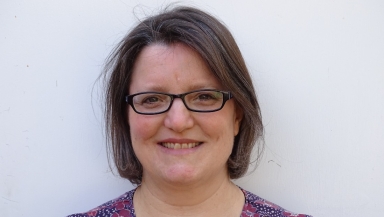
Tina English is the author of new book, A Great Place to Grow Old: Re-imagining Ministry Among Older People, published by Darton, Longman & Todd.
In it, she offers advice and resources to help individuals and churches reach out effectively to the older people in their communities.
This may include things like visiting and supporting seniors in local care homes, and coming alongside those living with dementia and their carers.
The book comes from her own experience as a nurse and working in the charitable sector with local organisations supporting the over-65s.
For the last six years, she has been mobilising trained volunteers with Christian charity Embracing Age to reach out to what she calls "the oldest, frailest and most isolated – those who society has overlooked and ignored", including many in care homes.
Christian Today talked to Tina about her new book and how the Church can minister effectively to older Christians.
CT: Your book contains lovely stories of older people whose lives have been transformed by the practical care they received from Christians in local communities. Is there one that stands out for you?
TE: Yes, one that stands out for me - that highlights how the little we do makes such a big difference - is the story of an elderly gentleman in a care home who was visited weekly by one of our volunteers. He had been an officer in the Armed Forces during the war, and he was confined to a wheelchair due to having his leg amputated.
Each week our volunteer would give him a manicure and a hand massage, which he really enjoyed and would look forward to with eager anticipation. She asked him one week why he looked forward to it so much, and this dignified gentleman started to cry, as he explained that it was the only touch he received; it was the only time someone held his hand.

CT: Your book recommends volunteers learning to give hand massages to people with dementia in care homes, many of whom, like the gentleman you mentioned, greatly appreciate the comfort this touch brings. But what are the safeguards for church volunteers doing this and for the recipients?
TE: With any work we are doing amongst older people, our volunteers will have been appropriately vetted, whether that is completing a self-disclosure form, taking references or carrying out a DBS check where appropriate.
And volunteers need to be trained in how to give a gentle hand massage safely, especially to frail older people who may have sensitive skin. If a volunteer is in the communal lounge, there are usually other residents and staff around, but if they are in the resident's bedroom, which might be the case if the resident is bed bound, then it's a good idea to leave the door open.
Of course, we need to ask the resident for permission, but not all of them will have the capacity to communicate, so we may have to respond to non-verbal cues and body language, such as them withdrawing their hand. Whilst touch is not for everyone, for many it is something they are deprived of, all the more since the pandemic.
It's likely that there will be regulations in place in care environments at the moment that limit therapeutic touch due to infection control, but as we slowly move beyond Covid-19 and the fear that stems from it, gentle hand massages, given sensitively and appropriately, are a wonderful tool to connect with people on a deeper level and enable them to experience the benefits of therapeutic touch.
CT: You quote the late US evangelist Billy Graham who said: "All my life I've been taught how to die, but no-one ever taught me how to grow old." How can local churches remedy that in your view?

TE: That's a very good question because as Christians we don't just have the hope of life after death, but also of life in all its fullness before death, along with precious promises about God being with us and sustaining us in our later years. Perhaps part of the answer is seeing discipleship as a lifelong process where we journey with others who have already trodden the road before us.
Jesus walked and talked with his disciples. I think there's a danger of reducing discipleship to a few courses we do along the way like Alpha, a marriage course, a parenting course, a leadership course etc. I'm sure doing a retirement course might be beneficial to some, but you may not be experiencing many of the challenges of ageing at 70, compared to when you're in your 90s.
Seeing discipleship as a lifelong journey could help us at every stage of life, whether that is navigating the challenges of middle age, retirement, or older age - a beautiful interdependence on one another.
I also think the Church should be leading the way on rewriting the narrative on ageing. We have a story to tell of God's love and faithfulness, of the intrinsic value of every individual that isn't based on their productivity. We should be leading by example as we love across the generations - a family where every member is valued and has a sense of belonging.
One of the stories I share in the book that fills me with joy is my daughter coming back from a big Christian Union camp for university students. She told me that one evening, instead of having the usual speaker, they invited some older Christians to share about remaining faithful to God in the long haul. It was the highlight of the camp for many of the students.
CT: You highlight the importance of Christian carers being clear on the gospel message God is calling them to share. You say: "It seems to be much more difficult (and potentially offensive) to share the gospel these days." How can Christian carers communicate the gospel clearly to older people without being open to the accusation of taking advantage of the vulnerable or shoving the message down people's throats?
TE: In the chapter on mission I'm not specifically talking about Christian carers, but about any of us who are involved in ministry amongst older people from a Christian setting, with the challenge for us to clarify the vision and purpose of our ministry.
Are we simply aiming to reduce loneliness, or improve wellbeing (which are noble goals), or do we also want people to know and experience life in all its fullness that Jesus promises? If so, we need to be intentional about giving them opportunities to explore Christian truth.
In the context of church-based activities, inviting people who are involved to explore the Christian faith can't (or at least shouldn't!) be construed as shoving the message down their throat. They can always decline the invitation. And I think it's also important to point out that not all older people consider themselves vulnerable.
Christian carers working in secular settings with vulnerable older people is a different context completely. I am someone who doesn't like to break rules, and I tread very carefully and cautiously in those sorts of situations. As I mention in the book, it was drummed into me as a nurse that I wasn't allowed to share my faith within the context of my work so, rightly or wrongly, I didn't.
That's not to say that I couldn't demonstrate God's love by my caring actions or let people know that I would be praying for them, if that seemed appropriate at the time.
On the other hand, if you have been invited into a care environment under the umbrella of the Church, there is an expectation that you are there to support the spiritual needs of the individuals you visit, and with that the opportunity to share the gospel with sensitivity and gentleness.













